Obama finds support among Chavez faithful in Caracas
October 24, 2012 -- Updated 1153 GMT (1953 HKT)
STORY HIGHLIGHTS
- Hugo Chavez endorsed Obama, calling him a 'good guy'
- Venezuela-U.S. relations have been rocky for more than a decade
- Romney's harder stance on Chavez appeals to Venezuelan opposition
- America remains Venezuela's biggest oil market
Editor's note: Girish Gupta is a British freelance journalist based in Caracas, Venezuela. His work has appeared in TIME, Reuters, BBC and many other news outlets.
Caracas, Venezuela (CNN) -- Standing in his food shack under posters of Venezuelan President Hugo Chavez in a Caracas slum, 70-year-old Miguel Bigello relays his backhanded support for Barack Obama.
"For all the deaths he's caused, he's not touched Latin America," he said. "The other guy [Mitt Romney] is too radical. He will fight here for the oil."
The elderly man is an avid supporter of Chavez, his "Comandante," and in the small wooden hut sits a carving of the face of Che Guevara as well as a poster depicting Latin American independence hero Símon Bolívar.
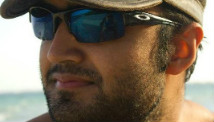
Girish Gupta
Bigello shares the view of his president. "If I was from the U.S., I'd vote for Obama," Chavez said buoyantly on state television just a week before he won his third six-year term two weeks ago, potentially extending his tenure to two decades. "Obama is a good guy."
Venezuela is still hungover from its own presidential election and in this fervently political country — mostly thanks to Chavez's ubiquity, strength of personality and polarizing policies — the U.S. election campaign offers some light relief after a trying few months.
The contest between Chavez and Henrique Capriles, the Venezuelan opposition's first real hope in 14 years, made the Romney-Obama matchup look like child's play. Chavez welcomed his opponent to the ring in February by calling him a "low-life pig" who would be "pulverized." There were no debates here as Chavez felt Capriles was below him. "The eagle does not chase flies," said a defiant Chavez.
The self-styled socialist leader's supporters see Obama taking a leaf out of Chavez's book. "Obama is working for the people just like Chavez," said Gomez Darwin, 42, stood under a huge Che Guevara mural in a primarily Chavez-supporting Caracas barrio.
However, it is the contenders' world views which really matter here. Gloria Torres helped organize prayer vigils for Chavez as he suffered cancer last year. "Obama's policies towards Latin America haven't been aggressive," she said, offering her support for the U.S. incumbent before adding: "The other guy doesn't seem to have any friendly intentions towards us!"
Venezuela has come up a number of times in Republican rhetoric during the U.S. race. Mitt Romney branded the Venezuelan government a "threat to national security" earlier this year, adding that Chavez had spread "dictatorships and tyranny throughout Latin America."
Romney's running mate, Paul Ryan, added: "In a Mitt Romney administration, we will not keep practicing this policy of appeasement ... We will be tough on [Cuban President Raúl] Castro, tough on Chavez. It's because we know that's the right policy for our country."
This antagonism from the Romney camp towards Chavez — compared to Obama's softer approach — has attracted some of Venezuela's more wealthy hard-line opposition.
"Romney named Chavez in his manifesto; Obama didn't," said Aixa Armas, eating breakfast at one of Caracas' high-end hotels. "Obama has closed his eyes to the problem, a regional problem, and he is too friendly with Chavez."
The lubricant between Caracas and Washington is the world's highest oil reserves on which Chavez sits. It is that wealth that has kept Venezuela's economy from collapsing -- despite epic mismanagement which has led to the region's highest inflation rate and a severe shortage of U.S. dollars. America is Venezuela's biggest oil market and the Latin American country is among the top five exporters to the U.S..
"The U.S. remains the only actual customer paying cash and at full-price," said Russ Dallen, head trader at Caracas' BBO Financial Services. "Romney may want to use that leverage to stop subsidizing a thorn in America's side."
Dallen adds that Venezuela, or at least the Chavez government, needs oil prices to stay high, and Obama may be a safer bet for that. "Obama is more willing to tolerate high gasoline prices because gas at $4 a gallon makes people more willing to invest in alternative technologies and for those technologies to be more cost effective."
Chavez is unlikely to be thinking in such depth. His support for Obama recently marks the apex of the 58-year-old strongman's relations with Washington since coming to power in 1999. The infamous nadir came in 2006 when Chavez stood at the United Nations lectern, theatrically sniffing the air. "The devil came here yesterday," he said, a day after former President George W Bush's speech. "It smells of sulfur still." He then went onto describe Bush's "domination, exploitation, and pillage of the peoples of the world."
Chavez quipped two weeks ago that Obama would support him too, had he been born in Venezuela's slums. After some shaky relations, Chavez is prepared to start again. "With the likely triumph of Obama, and the extreme right defeated both here and there [in the U.S.], I hope we can start a new period of normal relations."

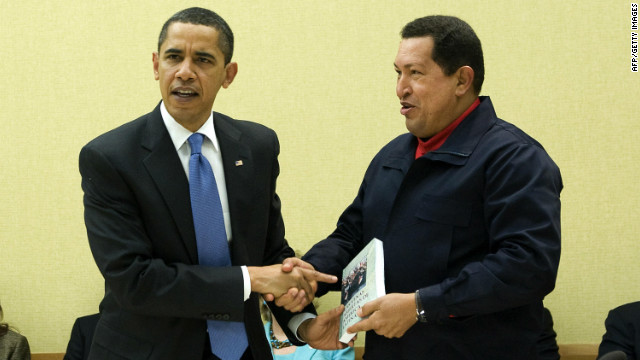 Barack Obama received a somewhat surprising endorsement in early October when Hugo Chavez called said, "I'd vote for Obama." In 2009, Chavez shook hands with the president and gave him the book "Open Veins of Latin America: Five Centuries of the Pillage of a Continent" during a summit.
Barack Obama received a somewhat surprising endorsement in early October when Hugo Chavez called said, "I'd vote for Obama." In 2009, Chavez shook hands with the president and gave him the book "Open Veins of Latin America: Five Centuries of the Pillage of a Continent" during a summit. 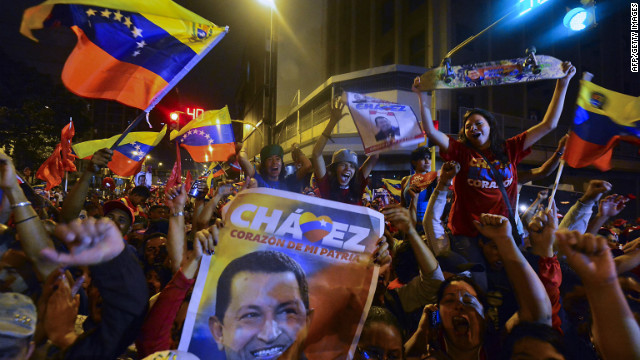 The two countries have had a contentious relationship for years, but in 2012 they have something in common -- a general election. Chavez recently won a third consecutive term as president of Venezuela. Here, supporters celebrate after receiving news of his victory in Caracas on October 7.
The two countries have had a contentious relationship for years, but in 2012 they have something in common -- a general election. Chavez recently won a third consecutive term as president of Venezuela. Here, supporters celebrate after receiving news of his victory in Caracas on October 7. 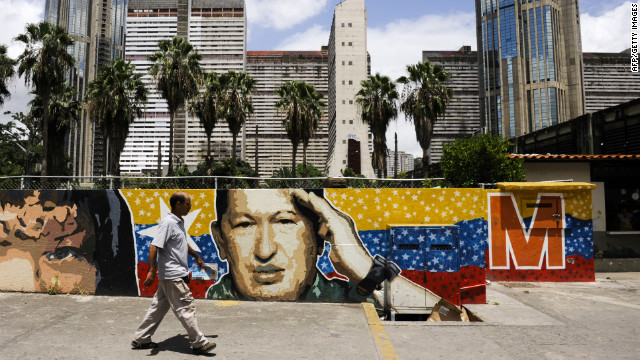 Journalist Girish Gupta says Venezuela is still recovering from the hangover of the brutal campaign between Hugo Chavez (pictured in a Caracas mural) and opposition challenger Henrique Capriles.
Journalist Girish Gupta says Venezuela is still recovering from the hangover of the brutal campaign between Hugo Chavez (pictured in a Caracas mural) and opposition challenger Henrique Capriles. 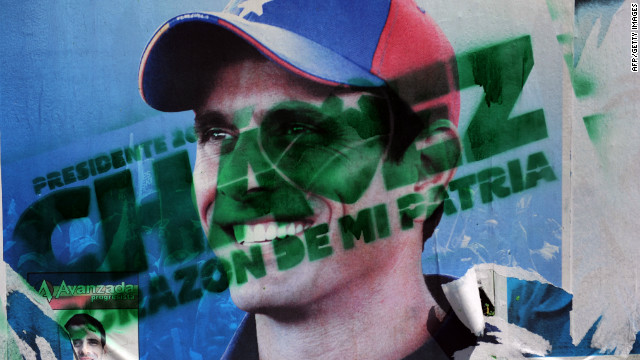 Gupta says Chavez welcomed his opponent to the ring in February by calling him a "low-life pig" who would be "pulverized" -- and there were no debates in Venezuela as Chavez felt Capriles was below him. Here, a poster of Capriles is defaced by Chavez supporters.
Gupta says Chavez welcomed his opponent to the ring in February by calling him a "low-life pig" who would be "pulverized" -- and there were no debates in Venezuela as Chavez felt Capriles was below him. Here, a poster of Capriles is defaced by Chavez supporters. 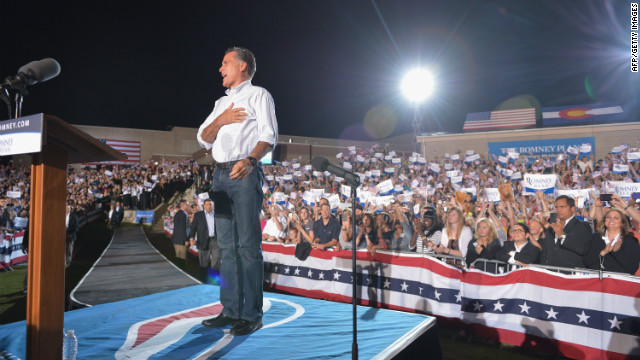 Gupta says some Venezuelans are alarmed by Romney's anti-Venezuela rhetoric. The Republican hopeful branded the Chavez government a "threat to national security" earlier this year, adding that Chavez had spread "dictatorships and tyranny throughout Latin America."
Gupta says some Venezuelans are alarmed by Romney's anti-Venezuela rhetoric. The Republican hopeful branded the Chavez government a "threat to national security" earlier this year, adding that Chavez had spread "dictatorships and tyranny throughout Latin America." 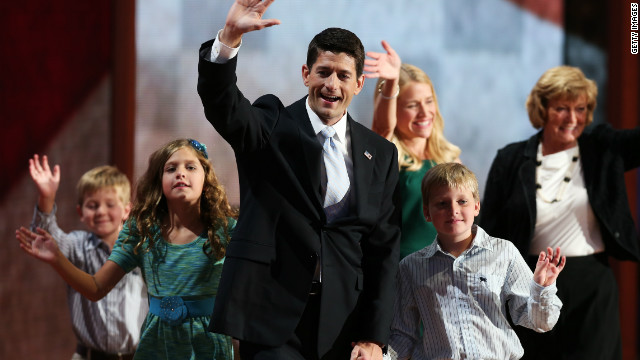 Romney's running mate, Paul Ryan, has said their administration would be "tough on Chavez," a message that resonates with Venezuela's hard-line opposition to the president that has helmed the country since 1999.
Romney's running mate, Paul Ryan, has said their administration would be "tough on Chavez," a message that resonates with Venezuela's hard-line opposition to the president that has helmed the country since 1999. 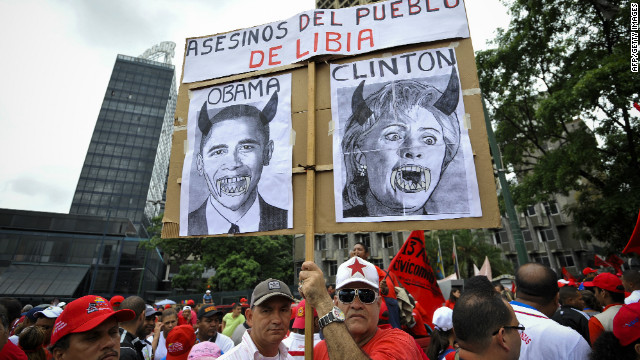 Despite Chavez's recent endorsement of Obama, not everyone approves of the job Washington is doing. Here, protesters hold a poster reading "killers of Libyan people" with portraits of Barack Obama and Hillary Clinton in Caracas, Venezuela, on April 13, 2011.
Despite Chavez's recent endorsement of Obama, not everyone approves of the job Washington is doing. Here, protesters hold a poster reading "killers of Libyan people" with portraits of Barack Obama and Hillary Clinton in Caracas, Venezuela, on April 13, 2011. 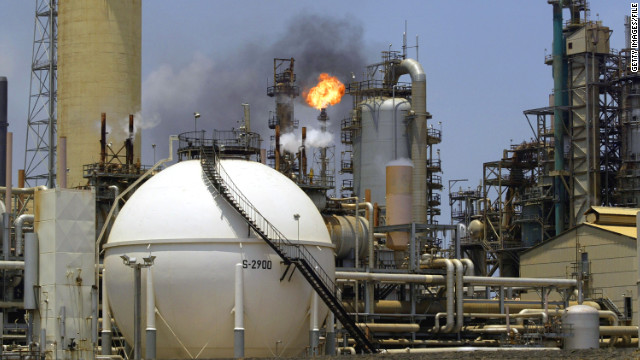 The lubricant between Caracas and Washington is the world's highest oil reserves, says Gupta, which Chavez is sitting on. Some analysts believe Obama is more willing to tolerate the higher gas prices Venezuela needs in order to keep its oil-dependent economy from collapsing.
The lubricant between Caracas and Washington is the world's highest oil reserves, says Gupta, which Chavez is sitting on. Some analysts believe Obama is more willing to tolerate the higher gas prices Venezuela needs in order to keep its oil-dependent economy from collapsing. 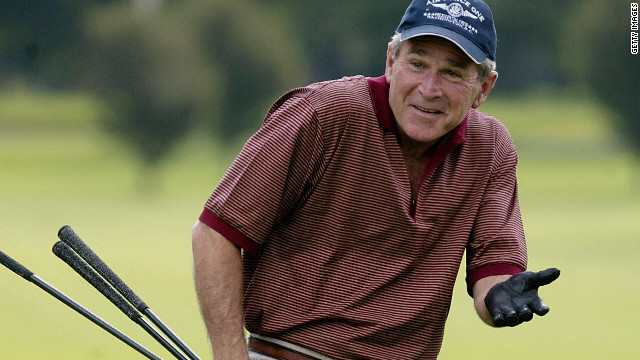 The nadir of recent U.S.-Venezuela relations came in 2006, when Chavez called then-president George W. Bush "the devil" at the United Nations General Assembly.
The nadir of recent U.S.-Venezuela relations came in 2006, when Chavez called then-president George W. Bush "the devil" at the United Nations General Assembly. ![But after years of shaky relations, Chavez appears prepared to start again, saying: "With the likely triumph of Obama, and the extreme right defeated both here and there [in the U.S.], I hope we can start a new period of normal relations."](http://i2.cdn.turner.com/cnn/dam/assets/121003070702-chavez-crowds-horizontal-gallery.jpg) But after years of shaky relations, Chavez appears prepared to start again, saying: "With the likely triumph of Obama, and the extreme right defeated both here and there [in the U.S.], I hope we can start a new period of normal relations."
But after years of shaky relations, Chavez appears prepared to start again, saying: "With the likely triumph of Obama, and the extreme right defeated both here and there [in the U.S.], I hope we can start a new period of normal relations."
ไม่มีความคิดเห็น:
แสดงความคิดเห็น